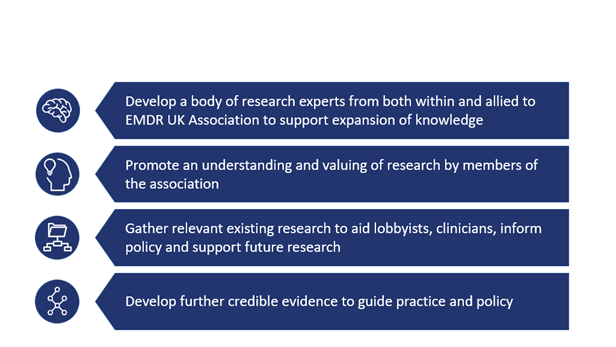Scientific & Research Committee Update
The Scientific and Research Committee (SRC) is energetically working to deliver the EMDR UK Association research strategy which was presented in 2020. As EMDR clinicians we have direct experience of achieving change in clients that extends beyond the current published evidence base; but this is the lowest level of evidence that is accepted by commissioning services such as NICE, and therefore has the least influence on policy and improving access. We need to establish which of the expanding interventions available to EMDR therapists are effective, and for whom, to guide how we can achieve the greatest benefit to our clients and promote the reputation of the intervention. In line with our ‘guiding policy’ the following steps have been taken.

Develop a body of research experts from both within and allied to EMDR UK Association to support expansion of knowledge
We are currently forging links with academics in various universities in the UK. The research officer is in the process of contacting all the people who responded to a survey (conducted by Mark Brayne in 2020) to ascertain current research projects and future plans.
We are delighted to welcome six new members to the SRC. Each of them is an EMDR enthusiast and has an area of special interest and expertise which will be well used in widening the association’s network of collaborators and in bringing their knowledge to the membership.
Lorraine Tindale is currently working towards her PhD in walking EMDR at Anglia Ruskin University and has a special interest in veteran’s issues.
Shelley Bradley-Scholey is currently the EMDR pathway lead in IAPT Hampshire (iTalk) and has a special interest in evaluating the use of EMDR in primary mental health care services as well as in veteran’s issues having worked for the MoD and served abroad.
Nicola Pinder is a psychosexual therapist currently working towards a PhD in professional practice at the Salomons Institute of Applied Psychology. She is interested in the use of EMDR in relationship therapy and in psychosexual therapy.
Adam Horner is the community substance misuse service clinical lead for We are with you (Formally Addaction) in Lincoln. He too has a special interest in veteran’s issues having been deployed as a mental health nurse on several occasions to Afghanistan. He is studying for a PhD in EMDR for addictions and is working to provide integrated trauma treatment within drug and alcohol services.
Lorraine Haye is the lead clinical psychologist in a community specialist rehabilitation team for people with acquired brain injuries in the NHS. She also works in private practice and is interested in complex PTSD and humanitarian response.
Marta de Madariaga Lopez is a consultant clinical psychologist working in private practice. Her special interest is the trauma response and traumatic brain injury.
Promote an understanding and valuing of research by members of the association
A research FAQ is being developed as a resource. Answers to questions such as ‘how do I know if I need ethics committee approval?” and “how do I interpret a research paper?” will be available in one place with links to reputable sources.
The association’s own EMDR publication database will shortly go live. This has been developed in conjunction with information scientists at Sheffield ScHARR (School of Health and Related Research). It is hoped that it will encourage members to access the published research to support their clinical and research work. It is a reference collection of peer-reviewed research and dissertations/theses focusing on EMDR, available to EMDR UK members only. References are categorised by keywords relating to the clinical area and study type, allowing for easy browsing. The database can also be searched by terms of interest. Links to any available full text articles will be provided. Video resources on how to use the database are available on the bulletin board and the association webpage in the Members area. A dedicated email address has been set up for any queries. The EMDR database team can be contacted at: emdrdatabase@sheffield.ac.uk .
Gather relevant existing research to aid lobbyists, clinicians, inform policy and support future research
In addition to providing the EMDR publication database for members the SRC is now actively involved with NICE as a registered stakeholder. This is for all the relevant guidance areas and quality standards. It means that we are also able to become a “supporting organisation” for the quality standards.
Develop further credible evidence to guide practice and policy
We are focused particularly on PTSD, depression and psychosis. We were delighted to hear the results of the EMDR for psychosis feasibility study presented by Dr Gita Bhutani and Dr Fillipo Varese at their conference back in July. The research group had conducted the feasibility study against the odds after the arrival of Covid. Not only did they show that the study methodology was sound but also that EMDR is a viable intervention for people with psychosis. Because the study was a methodological feasibility study, the intervention will now be trialled in a study with sufficient power to demonstrate efficacy. The SRC will assist in helping to find trial therapists and supervisors.
The EMDR Association does not currently have the funds to support individuals in their studies, but this was not always the case. Anna Wippich, a PhD student at Northumbria University, benefited from funding awarded about four years ago and is about to submit her thesis. The results will lend additional support to the case for EMDR in PTSD and we are hoping that Anna will present her research at next year’s EMDR conference.
An exciting development is just starting, thanks to the generosity of the East Anglia region, which is providing funding for a feasibility study into online delivery of attachment-informed (AI) EMDR. This study is being conducted at the University for the West of England (UWE). A research assistant has just been appointed and shortly we will be looking for trial therapists and supervisors.
Other Projects
We have been contacted by Shireen Sultana, who is an EMDR practitioner and a counselling psychologist in training at the University of East London. She would appreciate your help in identifying participants for her research. Shireen has noticed that with the increasing demand for and provision of online EMDR there is a need to understand our client’s experience. There is very little about this in the published literature and having a client’s perspective is central to designing and shaping client-centred services.
Shireen is particularly interested in the experience of adult clients from an ethnic minority background who have had online EMDR for trauma symptoms and completed their therapy at least six months ago. They will be asked to take part in a 60-90 minute online interview. If you have clients who may be suitable for this project, please do contact Shireen at u0508553@uel.ac.uk . She will be pleased to provide more details for your clients.
Nicola Pinder is also looking for research participants. Nicola is the Chair of Sexology & EMDR Special Interest Group and is completing her PhD in professional practice at Salomons Institute of Applied Psychology. She is exploring the use of EMDR Therapy with presentations of a sexual focus, from the practitioner’s perspective. If you are interested in taking part you should be a COSRT accredited sex and relationship therapist and an accredited EMDR practitioner. Please do contact Nicola at np267@canterbury.ac.uk . She will be pleased to send you more information.




